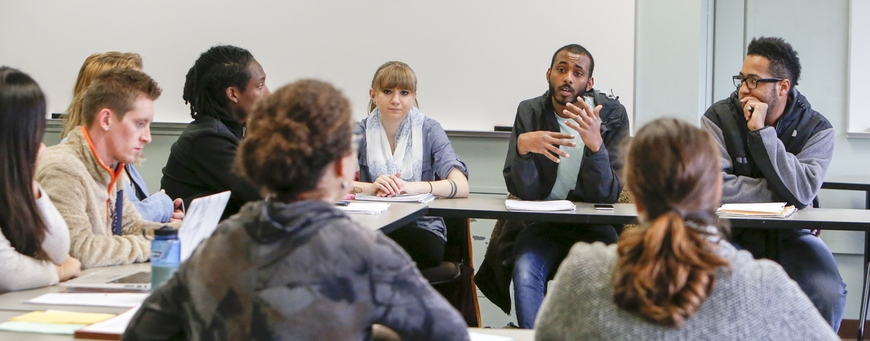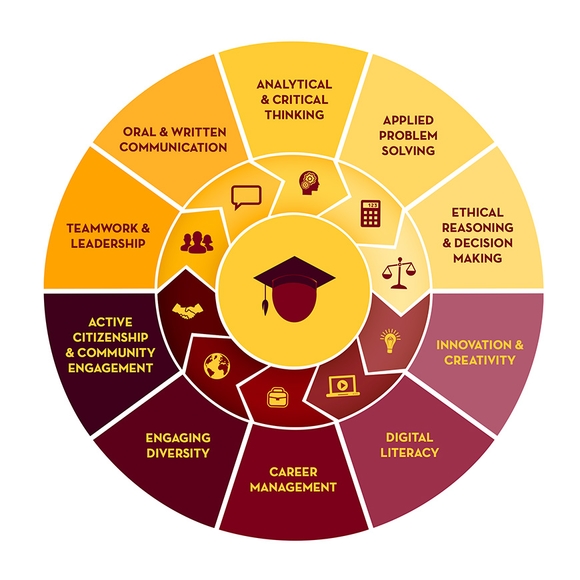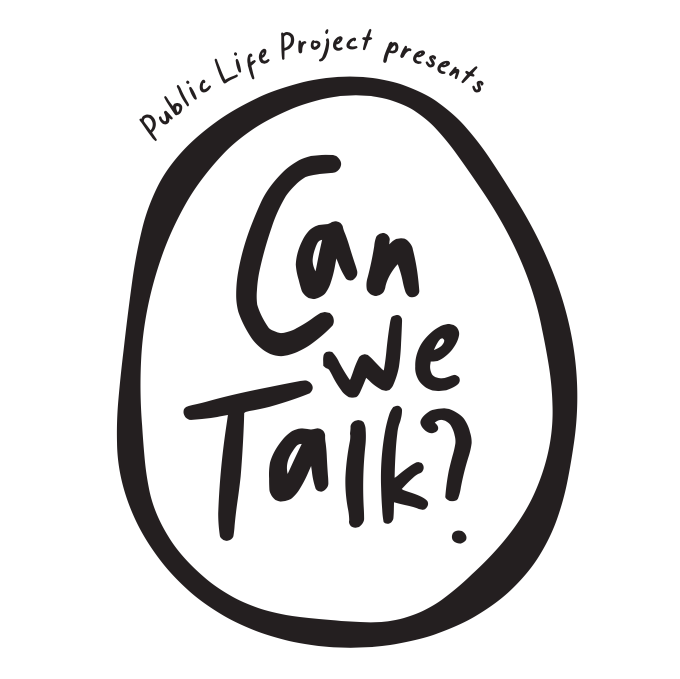Classes & Experiences


A liberal arts education involves engaging with ambiguity, new ideas, and those who differ from you—as represented throughout CLA's 10 Core Career Competencies.
To help engage with CLA's core competencies in an effective manner, the Public Life Project (PLP) Civic Readiness Curriculum seeks to prepare students to work towards equity, antiracism, and community change. It’s about life after the liberal arts, and learning the skills you need to be a good community member, whether your role is as a community leader, activist, politician, teacher, parent, volunteer, or citizen.
The core competencies that PLP civic readiness coursework specifically cultivates are Active Citizenship and Community Engagement, Engaging Diversity, & Oral and Written Communication by providing unique signature courses, co-curricular opportunities, and events for students.
Can We Talk?

Can We Talk? is an event series hosted by the Public Life Project with the goal of modeling difficult conversations and exchanges. The brainchild of economics professor Chris Phelan, the series puts two professors with different view points in discussion on difficult topics before opening up the conversation to students. With polarization on campus being higher than ever, Can We Talk? seeks to model rational discourse to help students simply talk to each other, both in their classes, and in their future lives and careers. In Fall 2022, the Public Life Project presented three topics, Is Populism Popular, Can Money Buy Happiness, and Can we Talk About Religion. Hosted in the beautiful Arthur Upson Room at Walter Library, the events encourage student engagement and participation. This spring, our CLA professors will be tackling topics like Crime, Community and Campus Safety, and the question Is Covid Over?
Crime, Community and Campus Safety - March 23rd, 2023
With public safety at the forefront of students' minds, Chris Uggen and the University of Minnesota Forensics team take on the question of crime on campus. They'll tackle tough questions about policy, crime and more before inviting students to participate with their own thoughts about the University community and what the school has done in terms of safety. In partnership with the Debate club of the University of Minnesota.
Is Covid Over? - April 26th, 2023
As the Covid-19 pandemic winds down in the minds of the public, the question still remains, is Covid really over? We'll ask public health experts about the scientific aspect while also including important perspectives on the economics of Covid, as well as the societal impact that Covid had on the United States. With President Biden declaring the Covid state of emergency over, it's time to ask is Covid really over? In partnership with the Debate club of the University of Minnesota.
PLP Civic Readiness Curriculum
Freshman Seminars
Ever thought to yourself, how do I use what I am learning and apply it to my community? If so, the civic readiness freshman seminar might be for you! This seminar is part of the University of Minnesota’s broader initiative to reconnect undergraduate students back to the very communities in which they live and come from by providing the analytical tools of critical thinking, community building, and social outreach (among other skills) that comply with the College of Liberal Arts core competencies of Active Citizenship & Community Engagement and Engaging Diversity.
The world is changing, but that doesn’t always mean positively. Be part of the positive change by learning how not just to be a better student but a better member of your community. Course registration information coming soon. View course titles, course descriptions, and registration links below.
Assistant Professor Madelaine Cahuas
This seminar will explore the interconnected histories, geographies, and politics of the Twin Cities – Minneapolis and St. Paul, Minnesota. Drawing on urban geography, urban studies, feminist, race, and ethnic studies scholarship, we will examine how settler colonialism, anti-Black racism, and other intersecting forces of oppression shape how urban spaces are formed and experienced in the Twin Cities.
We will also closely examine and compare how different urban actors, from local grassroots collectives, non-profit organizations, and city governments, have sought to address social, economic and spatial inequities and work towards social justice. Furthermore, we will deeply engage with the longstanding histories and presents of Black, Indigenous, and Latinx activism in the Twin Cities. Students will have the opportunity to learn from local community organizers and go on several field trips to learn about social justice and social change in the Twin Cities.
Associate Professor Diane Willow
As the Mississippi River flows through campus it shapes the site of a seventy-two-mile urban national park in the heart of Dakota homeland. With the river as our catalyst for artistic inquiry and interdisciplinary collaboration, we will participate in creative research that connects culture, ecology, design, history, and the power of place.
We will synthesize perspectives gained from our direct experiences with the river as we launch aerial cameras, create sound walks, record underwater views, participate in digital storytelling, and host conversations with guest artists, architects, culture keepers, composers, scientists, and historians. While engaging in individual and collaborative projects you will meet students with a wide range of interests and life experiences.
Together, we will focus on learning about the Mississippi, and ourselves, by cultivating a personal relationship with the river and experimenting with art to convey this.
Professor Douglas Olson
Homer's Odyssey is the story of a man who returns from war to find a world much different from the one he left ten years earlier—and one that seems to have no place for him. On his way home, he lies to some, robs and murders others, and, arguably through his own negligence, loses all his men. Once back on his native island of Ithaca, he re-establishes his authority as a local strong-man through a mass killing of rivals. He is nonetheless emphatically a "hero" and the moral and political center of the story: what Odysseus does is (in the storyteller's eyes, and those of most readers ever since) right and just.
This seminar will use a close reading of the Odyssey, a study of Season One of the Netflix series House of Cards and of selections from Robert Caro's biography of Lyndon Johnson, and extensive discussion of contemporary political and social events, to ask what sort of political and social world Homer's poem imagines; how it formulates and discusses power and justice; how it encourages its audience to accept judgments about human behavior and "what is right" that may, upon reflection, seem horrifying; and what we are to make of this today.
Associate Professor Karen Ho (anthropology) and Professor William P. Jones (history)
Is racism integral, or antithetical, to the American dream? To what degree has its promise of freedom and prosperity rested on the exclusion of Indigenous, Black and other People of Color from those opportunities? Have white Americans achieved its promise of freedom and prosperity at the expense of others? Or, has the dream been perverted by the exclusion of Black, Indigenous, and People of Color to what Martin Luther King described as "a lonely island of poverty in the midst of a vast ocean of material prosperity"? Moreover, to what extent have Americans resisted their exclusion or the exclusion of others from the promise of the Dream?
Given that in the contemporary moment, inequality in the US has surpassed that of the Great Depression, what do these fractures and contestations in the American Dream mean for a larger society experiencing rampant precarity writ large? This pair of seminars (ANTH 1917 and HIST 1917) explores these questions in dialogue, occasionally meeting together and with a larger group of seminars connected to the College of Liberal Arts' Living and Learning in the Land of 10,000 Perspectives? Civic Readiness Initiative. We believe that this cross-fertilization is critical because the fault-lines of inequality have precisely cohered to these structural formations and categories of analysis, i.e. race and racism. Moreover, an interdisciplinary approach (through anthropology and history) is crucial for examining the contested nature, historical contexts, and contemporary investments of the American Dream.
Assistant Professor Sinem Casale
Have you ever seen a defaced statue? Ever heard of an image of a holy figure attacked or destroyed? Sculptures smashed and monuments taken down have filled our news feed and generated much heated public debate recently. What prompts such anger and violence? What makes some objects appear offensive and inappropriate? What kind of a threat do they pose?
Objects, images, and buildings have been attacked, mutilated, and destroyed throughout history, for their specific visual contents or their very existence have been seen as going against religious bans or upsetting common cultural values and political sensitivities.
Assistant Professor Molly Kessler
Medicine, as a field, is most often considered an expert, scientific enterprise. However, as the COVID-19 pandemic has acutely demonstrated, communication plays an integral role in how the public and experts alike understand and engage with medicine, medical research and recommendations, pharmaceuticals, diseases, and more. This seminar explores the relationship between language and medicine through a range of books, essays, podcasts, videos, infographics, and other forms of writing and communication.
By examining popular and technical writing, we will study the diverse factors that impact medicine and how we communicate about it, including politics, clinical trials, racism, emotions, empathy, biomedical technology, social media, popular culture, and ethics. In addition to studying the relationships between medicine and language, we will also practice writing for a variety of audiences and on a range of topics.
Associate Professor Hiromi Mizuno
Food is a basic part of our everyday life, but it is difficult to see macro-level political economy behind food and hunger. This seminar gives a basic understanding of how “hunger” came to be understood and dealt with globally after WWII, how Cold-War geopolitics affected food shortage and surplus, how the global food system has gotten us where we are, and what new options are being pursued now. In all these stages, the US has played a central role in shaping the politics of food and hunger. The first part of the course exposes you to important concepts and issues related to politics around world hunger, American food aid, and multi-national agribusiness; students learn how to read texts closely and how to connect American food aid to global politics. The second part of the course helps you acquire research and communication skills; students learn how to conduct independent research and how to use a digital humanities tool called StoryMap. The course is composed of lectures, discussions, documentary film viewing, and research/StoryMap creation.
Assistant Professor Dwight Lewis
In this course, we will engage concepts related to Blackness, particularly race, gender, and sexuality. We will investigate them individually then through conversation untangle the ways that they intersect. We will see that Black philosophers reveal an epistemic insight from the ways that they push on the western status quo both rationally and morally. In terms of rationality, Black philosophers propel us to redefine Blackness, sexuality, imperialism, communal care, and whiteness in general. In relation to morality, Black philosophers place us in a tension between the inner and the outer, the individual and the community, the personal and the social; it insists on seriously inquiring into the blame, blameworthiness, and shame that avoids and rejects Black lives, i.e., of the outer, the community, and figure without being on the edges of society. It is at this intersection of the rational and moral in relation to Blacks that a breakdown of singularity creates a new something. I want us to get close to understanding that “new something” by exploring the rational and moral in Black thought.
Associate Professor Patrick Bruch
This freshman seminar will introduce students to the intellectual projects of studying and participating in higher education as a participatory institution by inviting freshmen into critical dialogue with past, present, popular, and academic representations of higher education and its civic purposes. We will examine the shifting role of the university in public life and the roles that students and other constituencies have played in shaping the character of higher education through writing and other activities. Designed specifically for first-year students, the course will combine academic skill-building with personal and collective reflection on the actual and possible purposes and values of higher education for individuals and the society.
Signature Courses
Associate Dean of the Social Sciences in the College of Liberal Arts and Arleen C. Carlson Professor of Political Science and Psychology Howard Lavine
One of the Public Life Project’s signature courses—Topics in American Politics: Why So Polarized? Understanding the Other Side—will provide you with the knowledge and skills needed to grapple with polarizing divisions and inequalities, engage empathetically with others, and to lead an active, meaningful public life. You will actively engage thoughts and ideas from across political and ideological spectrums to cultivate socio-historical understandings of polarization. You will also explore the social, political, economic, and cultural impacts of polarization from a cross-disciplinary perspective in local and global contexts. Y
ou will read, discuss, and debate cutting-edge material from documentaries, podcasts, popular press, and academic literature. Discussion will also cover anti-intellectualism and the role of universities; the role of social movements in creating social change; the importance of defending democratic institutions; moderation, conservatism, liberalism, extremism, and radicalism.
Professor Doug Hartmann
May 25, 2020, will be a day of infamy as the killing of George Floyd pushed the narrative of Minnesota’s progressive image to the brink. This seven-week course takes place during the second half of the fall 2021 semester, on Tuesdays from 4pm to 5:40pm from October 26 through December 15, 2021. It will be taught by Doug Hartmann, professor of sociology.
The course is open to students and community members and uses a new book of diverse, first-person essays titled Sparked: George Floyd, Racism, and the Progressive Illusion of Minnesota to reflect on the significance, complexity, and tragedy of race in the wake of the summer of 2020. This critical yet engaging class will focus on the issues of race, racism, and structural inequality in Minnesota that coincide with the College of Liberal Arts core competencies of Active Citizenship & Community Engagement, Analytical & Critical thinking, and Engaging Diversity.
Featured Courses
Assistant Professor Benjamin Toff
Sharpen your understanding of public opinion and its role in political and civic life: What does it mean? Where does it come from? How is it measured? What impact does it have? How are the public's preferences shaped by the larger communications environment and the strategic messages of politicians, interest groups, and other actors in society? What are polls really measuring, and why do they seem so unreliable sometimes? How are social media technologies giving voice to new segments and dimensions of public opinion? But how are they vulnerable to manipulation from bots and other efforts designed to alter perceptions of collective opinions? Examine the theories of communication, psychology, political science, and sociology that underlie these dynamic questions. We'll consider cutting edge approaches used by market researchers, political analysts, and data scientists to harness new forms of data about what the public thinks. We investigate theories that explain how people form their opinions, deliberate with others, change their minds, and reveal their preferences, and we apply these frameworks to understand contemporary public opinion issues and campaigns.
Assistant Professor Danielle Brown
How are our perceptions of crime been influenced by the news? How do social movements use media to share their messages? What can we as audiences do? Social media, news and entertainment media help shape our ideas about identity and differences. Learn how representation and inclusion have been negotiated through media with a particular focus on local case studies. Topics include race, ethnicity, social class, physical ability, and gender. Students will learn how to use media literacy to build a just and equitable society.
Assistant Professor Bennett McNulty
In this course, much of our focus will be on what makes reasoning good or bad. We will learn to suss out bad argumentation, and pinpoint the precise mistake in reasoning that is at fault in particular cases. Patterns will emerge, which will help us learn how to better argue for beliefs that we hold, and claims we take to be true. We will especially focus on developing these skills in various, real-world contexts, so that they can be transferable to your future life, career, and decision-making. To that end, special attention will be paid to the kinds of traps we can fall into when we encounter argumentation via social media.
Clubs and co-curricular opportunities
Join students in understanding the issues and activating your voice for change.
- Minnesota Bipartisan Issues Group
- Minnesota Debate & Forensics Team
- College Democrats
- College Republicans
- Center for Community-Engaged Learning
- Search for opportunities through Student Union and Activities
Events and experiences
Take advantage of on-campus opportunities to learn and explore the issues.